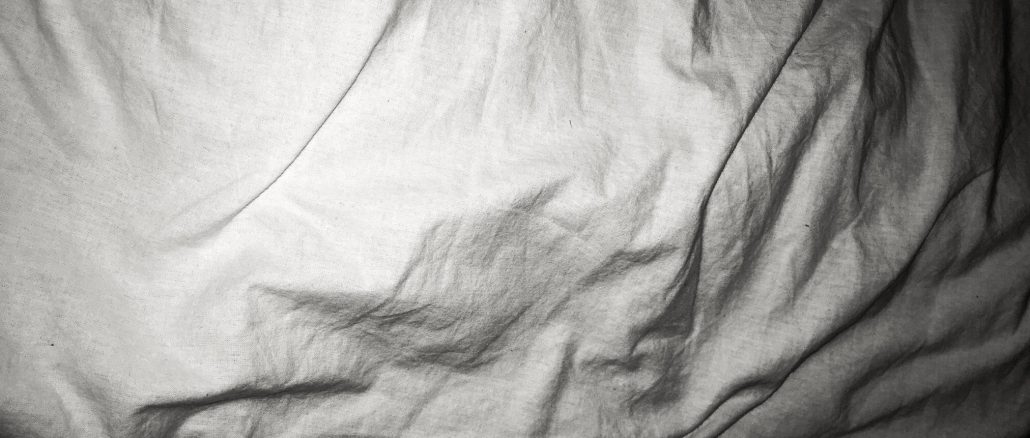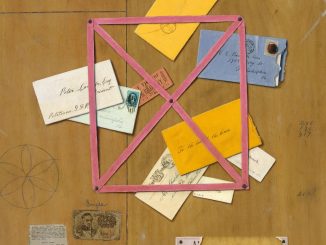
I found your obituary. You died in the first hours of the new year. It’s August now.
For eight months, I thought of you not knowing you had ceased to exist. That your funeral had taken place. That in a cemetery in a town not too far from here, there must be a small wooden cross with your name, your date of birth, and when you died. You didn’t want a stone, you once told me. No casket, just a white sheet.
Images arise: I can see you from behind, your head leaning to the right. You turn around and I can see your smile, your receding hairline. Your shoes are unfashionable, but you make a point wearing them till they come apart at the seams. Your navy jacket, weather proof, and a scarlet scarf – so typical of you it’s also mentioned in your obituary in the parish newsletter.
Parishioners will remember your independent way of thinking, your commitment to the youth of the parish, whom you helped find their way in our increasingly complex world. Your many gifts: Playing the guitar, singing, your skillful way of reading to others. You were so innovative, unique in your thoughts, even rebellious at times. You will be dearly missed; there was so much you had to give. You are resting in God’s eternal peace.
I type your name into the search engine again and find another obituary in another parish newsletter. This is the parish you left over 25 years ago, looking for new challenges, you claimed. They mourn along with your family and are comforted by the certainty that God holds you in his caring hand.
Staring at the screen, I’m transfixed: Your photo is darkened, for whatever reason, but badly so, and you are looking at me through black pixels, laughing. Is this a photo I took? I know your blazer jacket so well, your off-white turtle neck sweater, and your eyes turned to slits as you laugh. No, I didn’t take the picture. You were slimmer during our time.
I wonder what took you. You weren’t that old, not even 70. I always expected you to live longer. You were health-conscious: wholesome food, exercising, push-ups and pull-ups every day. Slim in those jeans, your Birkenstocks, your turtleneck sweater.
The thought you might live forever made the bile rise in my stomach, made me bite my knuckles. I knew you would always feel you were beyond blame, that nothing you did was wrong. A distraction, maybe; a mistake, almost juvenile. Or pure romanticism, the belief that your life would be profoundly changed, improved, and why not mine—there was no way this could be harmful. Such a lonely girl, a little tiresome, with deficits in her socialization, as you said.
How is taking care of a girl like that, a girl no-one wants, not her mother, not her father, ever a bad thing? It’s a neighborly deed, an act of pastoral care to listen to someone like her, to give her attention.
That’s what you told your wife when she caught us in the room in the steeple where the youth group met, when she threw her keys at me, just a few months into our story. That’s what you told her years later, when you went abroad to visit me, while she was keeping up the façade at home. What you told her when, after the abortion in London, you put me up in your home. There was no other place to go for me.
Your wife had stopped eating weeks ago, her eyes big, a watery blue in a gaunt face, glaring at me before she turned to bang her head on the walls of the old parsonage, again and again. Her voice shrill, interrupted by sobs. She then drove off in your car, in the middle of the night. Your voice deep, self-assured: We have to protect her. So I needed to be patient. Who knows what she might do to herself.
By the way, you said, I had to have sex with her today, she insisted. Although I only want to be with you. I want to be close to you. Completely close. It’s a physical pain if I can’t be with you now. You are the one causing me these feelings. Why do you claim to be tired now? You are like an inherently stable ship, one that flops over and capsizes when the gales get too strong. All I want to do is be close to you. This you told me.
The first moment I saw you—was that the beginning of everything? You opened the doors of the parish office to my mother and me. You gave us a big smile and signed me up for confirmation classes and for a trip with the other youth. You were new to the parish, the trip was a new idea, people were still reluctant. But in the end the trip took place and you took 25 of us abroad for a few weeks, before our confirmation. My mother was happy to let me go, be rid of me for a little while.
We had parties on the trip. The first one to celebrate Easter and the fact you had baptized some of us in a freezing cold creek in the middle of the night. I danced my first slow dance with a boy from our group. Then with your son, also part of the group. You had just baptized him. In the name of the father, and the son, and the holy ghost. As the next song began, you stood next to me, putting your arms around me. Come a little closer. My body was stiff as we moved in rhythm. Was this the beginning?
Years later: Your wife is at a conference overnight. I want to be with my friends, they’re getting together tonight, but this is such a precious occasion, one that might never come again. So you spell out to me what to tell them. Lying is not bad as long as it serves our love. As long as I can be close to you. I have a need. You make me feel these things. Your breathing is quicker, quicker; your movements are faster now too. Then it’s over and I know I can relax for the rest of the night.
I must not go near the windows. They might see me. The parishioners, some of them are against you. For political reasons, because you think differently. They are so conservative, and if they knew, they would use it against you.
Let’s not allow that, you say.
But really, you assure me, there’s no need to be worried. People are so unimaginative. They couldn’t envision a love as pure as ours. It’s beyond their small minds. But still I have to try to be as inconspicuous as possible, especially when entering or leaving the parsonage. Sometimes I have to hide in the attic because you claim you’ve heard your wife downstairs, coming home from work early, too early. Hurry, you say. Be quiet. No coughing, no walking around or they could hear you downstairs. I sit on the cold wood floor and ask myself how I will get out of here now, how I will get home. At one point you appear and tell me the coast is clear. It wasn’t her. You can come down now, I still have a need to be close to you. These are the words I hear you say.
Nobody knows you like I do, you tell me. They don’t see how beautiful you are, I’m the only one who knows, you whisper, and cup my breast. I’m beautiful but no one realizes? I remain silent.
We’re the Soldiers of Fortune, you say. We don’t know what will come. You can talk to me, you say, but not with others, that’s too dangerous. Your friends, these immature girls, they are jealous because the two of us get on so well, you explain. But they’ll never notice. How should they?
How should it occur to them that you are feeling me up while they are sleeping next to us, on their sleeping mats, on a stage in the parish hall? When you always end up sitting next to me and you’re the only one I talk to and I have strange excuses all the time.
But you are smart and daring. You kiss all of us girls that go along on parish trips and outings. There are always long good night kisses. Once I can feel the inside of your lips, wet, against mine. I’m disgusted, but I also feel gratitude that you don’t despise me.
This is before. This is during. I don’t know anymore.
Then your youngest son moves out, months before he graduates high school. Two weeks later is the first time you feel me up. Three weeks later and I’m at your home, upstairs in the master bedroom, while your wife is at work. I like your wife; I admire her. She seems empathetic, intelligent, she is kind to me. I try not to think of her as I’m lying in her bed. Dim light filters through the small window of your marital bedroom. Sometimes you have to switch on the church bells—they are electric—and I can hear them, close, loud. The lowest one has a particularly heavy sound, somber, like it was crying for time long past. I try not to listen, but I hear its rhythmic resonance: lost years, lost years, lost years.
You want to be close to me, very close, more often now. I want to go. If you leave, you’ll destroy me, you tell me. There might be tears welling up in your eyes. I’m not sure. I look at you like a rabbit, hypnotized. The parish council does not want you anymore. That must be my fault. Well, not directly, it is also yours, because you love me so much. Never in your life have you loved anybody like you love me. And now you’re paying the price. How could I leave you, when you give so much, you give it all, for us? God alone knows that what we are doing is right. We do it for love. Next door, your wife, mother of your children, is banging her head against the concrete wall.
Is this the end? I need years to leave.
Years later, you have the audacity to call me. I hear your voice on the answering machine. What you say? I don’t know. I delete the message not paying attention to your words.
A dozen years have passed. I stare at your obituary. Incredulous, almost reluctant laughter overcomes me. Soft at first, then louder. One doesn’t laugh when someone has died. One is not happy that a life is over. I cover my mouth with my hand.
Now I’m just smiling, very slightly.
I feel within me an enormous, profound, all-encompassing silence.
Author
KINNA SORENSEN teaches English and Spanish to teenagers. She loves studying languages and speaks several of them. She is an activist against sexualized violence in public schools and in Protestant churches.
Featured image: Photograph by Sergiu Vălenaș on Unsplash.


